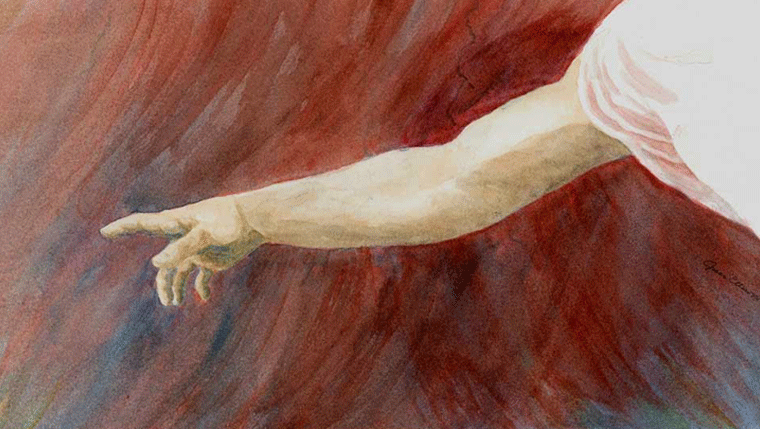And as they continued to ask Him, He stood up and said to them, “Let him who is without sin among you be the first to throw a stone at her.” And once more He bent down and wrote on the ground. John 8:7-8
Jesus stooped down and wrote in the dust. What was it that He wrote that caused a woman’s accusers to leave? The text doesn’t tell us, but there are some interesting theories.
A common suggestion is that Jesus wrote the names of the accusers followed by a sin they were engaged in. That’s possible. In His deity, He would have known such intimate information. He may have even listed them in order of their age, accounting for why they left, oldest first to youngest. But deferring to the oldest in the group to make a decision or action was a common practice of respect. The oldest probably would have also been given the position to throw the first stone.
Another suggestion is that since the accusers mentioned the Law of God, He started writing the Law – specifically the Ten Commandments, They would have also recalled that in Leviticus it expounded that both the man AND the woman were to be stoned. A point on this idea is that the tablets containing the Law in Exodus was written by the finger of God. If this interpretation is true, would they have seen the connection and possibly His identifying Himself with Almighty God?
A rabbinic interpretation of this event is that it didn’t matter what was written. His audience, knowing the OT inside and out, would notice His very deliberate act of bending down to write in the dirt and it would have brought the prophet Jeremiah to mind.
O Lord, the hope of Israel, all who forsake You shall be put to shame; those who turn away from You shall be written in the earth, for they have forsaken the Lord, the fountain of living water. Jeremiah 17:13
This extended passage in Jeremiah was read daily during the Feast of Tabernacles as part of the liturgy. It was just several days prior, during this Feast, that Jesus stood and declared Himself to be Living Water.
The passage surrounding that verse involves God judging the hidden heart and cursing those who have been unjust. This remez is also notable in that the passage that follows includes God’s healing mercy to those that cry out to Him.
I don’t know what Jesus wrote in the dirt, He chose not to tell us. But God makes it clear that those who don’t show mercy to the poor and powerless have turned from God. The self-righteous mob understood the message and, being convicted, stole away quietly. Jesus, who has the power to judge, chose mercy. He didn’t condone or ignore her sin, but told her to sin no more.
Whatever words He used; Jesus wrote mercy in the dirt. I’m glad my God grants me mercy by taking the cost of justice upon Himself. Having been granted mercy, may I be willing to convey the same mercy to those He puts in my path, even if it means getting a little dirty.







